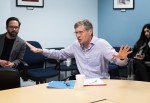UCLA labor advocates and experts analyzed the tactics and impact of the Los Angeles teacher strikes on teacher strikes nationwide Thursday.
Thousands of Los Angeles Unified School District teachers went on strike late January demanding smaller class sizes and increased staffing for public schools. Within five days, the district committed to reducing class sizes and hiring 300 nurses in addition to a 6 percent pay raise for teachers within the next two years.
Joshua Pechthalt, president of California Federation of Teachers, said he believes the strike, organized by United Teachers Los Angeles, became popular because UTLA organizers prioritized student concerns instead of teacher wages. UTLA is a union composed of several other organizations to advocate on behalf of LAUSD teachers and personnel.
“The fact that student concerns were put in the forefront inspired other factions of the working class to rise up,” Pechthalt said.
Eric Blanc, a panelist and former high school teacher, said he thinks unions should avoid prioritizing teacher wages.
“Unions should be fighting not only for teachers but for students and parents as well,” Blanc said.
Blanc, who wrote Red State Revolt, a book analyzing the recent teacher strikes, added he thinks the teacher strike is part of a larger movement mobilizing the working class across the country to fight for better working conditions.
“Teachers are at the forefront of the strike wave because of their ties to the community. (Their) structural leverage prevents them from being isolated and marginalized,” Blanc said.
Pechthalt, who has more than 20 years of experience as a high school teacher in Los Angeles, said teachers receive an almost immediate response to their demands because they play a fundamental role in communities across the nation.
“If schools are not in function, there are very few families in America that aren’t affected,” Pechthalt said.
Other attendees of the meeting said they shared Pechthalt and Blanc’s enthusiasm for the teacher strikes and the broader working class uprising.
Barry Eidlin, a sociology professor at McGill University who attended Thursday’s meeting, said he thinks the UTLA strike has had a historic impact on educational politics.
“Strikes are made to seem like they don’t work, but this is one of the first times a strike has scored big,” Eidlin said.
Both Pechthalt and Blanc said they predict more teachers will mobilize across the country, pointing to recent strikes in other states such as West Virginia and Arizona, as well as in California in Oakland and likely similar ones in Sacramento and Fresno in the near future.
“In the short term there is no foreseeable end to the strike wave,” Blanc said.
